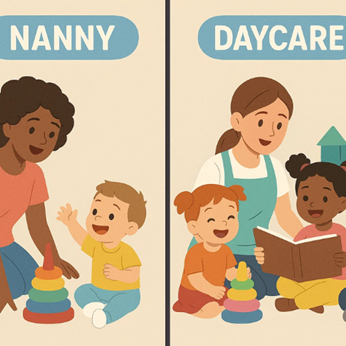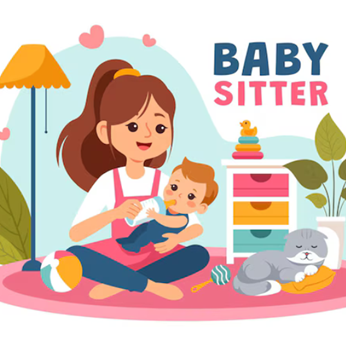Ways To Relieve Infant Hiccups
It was “Doctor’s Time” for the young mothers in New York last Sunday; they had invited a pediatrician come tell them the reasons for frequent hiccups in their infants. He told them that hiccups in newborns were common till their digestive system developed fully. Caused by the repetitive contractions of the diaphragm, overfeeding and swallowing air could cause hiccups.
Here are a few points that the pediatrician enumerated about hiccups:
1) Keeping a track of when and the duration of each hiccup help to determine if there is a common pattern and how to focus efforts on relieving the hiccup. It is best to note if the hiccups occurred during or after feeding; it would also help to look out for triggers to eliminate.
2) Overfeeding should be avoided by increasing the feeding frequency and breaking the baby’s feedings into shorter time periods; it would avoid quick distension of the stomach due to spasm in the diaphragm muscle.
3) Burp the infant frequently between feedings; burp him/her while switching breasts in case of breast feeding and after every 2-3 ounces if you bottle feed. Burping is best done by placing the baby upright across your chest, with the baby’s head on or a little above your shoulder. Then rub or gently pat the infant’s back making sure to not put pressure on his/her stomach; put one hand behind his/her legs while the other pats the back of his chest. Ensure you avoid the tummy region and resume feeding once he/she burps.
4) Reduce swallowing of air that lead to hiccups; this is indicated by the gulping sound the baby makes when it feeds. Indicating the infant is eating too quickly and swallowing air, it is best to slow down the feeding session by taking frequent breaks.

5) Next ensure that the infant is properly latched with its lips covering the areola in case of breastfeeding, with the bottle being tilted at 45 degrees in case of bottle feeding. Swallowing of air can be eliminated by using collapsible bag inserts for the bottle. The infant should be in semi-upright position, at about 30 to 45 degree during bottle feeding and 20 minutes thereafter. Staying upright can relieve pressure on the baby's diaphragm.
6) Start feeding the infant before it is very hungry or upset; a calm baby eats more slowly than a hungry and worked up one that could swallow excess air during a crying fit. It would also help to stop feeding the baby when it gets persistent hiccups; but if it continues to have hiccups, try feeding again to stop it.
7) There is a cause for concern if a baby experiences vomiting, painful night waking, and stomach pain along with hiccups; consult a pediatrician immediately as hiccups could be a symptom of gastro esophageal reflux disease or GERD. He/she would be in a position to prescribe medicine and provide recommendations on the ways to help your baby deal with GERD.
The young mothers felt enlightened with the tips the pediatrician gave them, with the doctor assuring them of all help with their infants and newborns.
Image Courtesy: Google
Take the next step toward your goals
Share your requirement and find the best care providers in your area
-
Looking for a caretaker’s job? Build your profile and get in touch with families in your vicinity.
-
Discover nannies, babysitters, cooks, housekeepers, pet sitters, and elder care under one roof.
-
Get all the support you need to run a successful care center.
-
Search for appropriate centers near you depending on your needs.
Care Corner Insights: Blog Library

Nanny vs. Daycare in Naperville, IL: What Works Best for Indian Working Couples?
Hey Naperville Parents! Balancing work and family life is no small feat—especially for Indian working couples trying to juggle careers, household responsibilities, and parenting. One of the biggest decisions you’ll face? Choosing between a nanny or

Housekeepers in Sugar Land, TX: Deep-Cleaning Checklists for Indian Homes
Housekeepers in Sugar Land, TX: Deep-Cleaning Checklists for Indian Homes Indian cooking = flavor + spices + love… but also oil splatters and stubborn stains. Time to reset! Degrease stovetops, chimneys, and exhaust fans. Scrub countertops, tiles,

12 Easy After-School Snack Ideas for Kids Who Get Hungry Quickly
School’s out, and the hunger hits hard! If your little ones come home ravenous and ready to raid the kitchen, you’re not alone. After-school snack time is prime time for refueling, recharging, and maybe even sneaking in a little nutrition. So here ar

Vegetarian Home Cook Services in Sunnyvale, CA: North & South Indian Meal Prep for Busy NRIs
Between work, family, and daily responsibilities, finding time to cook fresh meals can be difficult. That’s when a vegetarian home cook service in Sunnyvale makes life easier—bringing authentic North and South Indian dishes straight to your table. T

Hiring a Live-In Nanny in Plano, TX: A Practical Guide for NRI Households
For NRI families living in Plano, TX, raising children while managing work and household responsibilities can feel overwhelming. Many parents find that hiring a live-in nanny provides the right balance of support, convenience, and cultural comfort. U

Daycares in Fremont, CA for Indian Toddlers: Curriculum, Food Policies & Waitlists
You’ve probably met them — the parents at the park chatting about Montessori vs. play-based learning while handing their toddler a homemade paratha. The ones who ask every daycare in Fremont if they serve vegetarian meals. And yes, the ones who have

Babysitters in Jersey City, NJ for NRI Parents: Last-Minute, Weekend & Evening Options
You’ve probably seen them — the parents juggling grocery bags in one hand and a phone call to grandma in India in the other, while trying to keep their toddler from running into the road. The ones who cancel dinner plans because the babysitter bailed

Best Nanny Services in Edison, NJ for Indian Families: Costs, Language, and Cultural Fit
Edison, NJ, is home to one of the largest Indian communities in the U.S., and finding a nanny here often means looking for more than just childcare skills. For Indian families, cultural understanding, language fluency, and traditional values play a b

What Is Helicopter Parenting? How It Affects Children and Ways to Avoid It
You’ve probably seen them. The parents at the playground who shadow every move, wiping invisible germs off the slide before their child touches it. The ones who fill out job applications for their teens. And yes, the ones who email college professors

Are Weighted Blankets Safe for Children? Pros and Cons Explained
Weighted blankets have become a cozy trend in recent years. From helping adults sleep better to calming anxiety, they’ve earned a spot in many households. But when it comes to kids, especially the little ones, parents often ask: Are weighted blankets